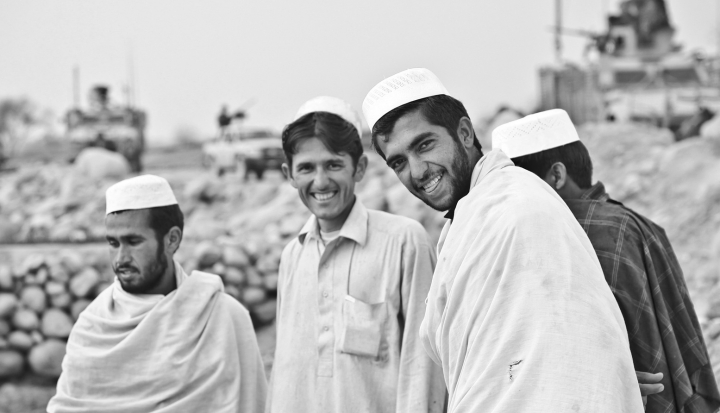Jafar Mahallati started his professional career as Iran’s ambassador to the United Nations (U.N.), where he had an instrumental role in ending the Iran-Iraq War in the late 1980s. It might seem like a jump from U.N. ambassador to his current position teaching courses on Islam and comparative religions at Oberlin College, but for him it all comes down to friendship.
Mahallati says friendship should be the basis of international relations. It is not enough to have justice, he says—this justice must be grounded in friendship. He uses the Second World War as an example: “After the First World War,” he says, “punitive justice was used too harshly on the losers. That, in many ways, created the Second World War. Therefore we need a paradigm that is stronger than justice alone. A ceasefire is not the same as peace.” True peace requires apology, forgiveness, and the ability to see another nation as worthy in its own right.
Religion is how to get there, Mahallati says. Christian and Islamic scriptures and philosophies are indications of how both faiths value friendship as the source of ethics—both intercommunal and personal. While friendship has implications for international relations, religion, and even economics, Mahallati is also adamant that it starts with each individual.
He talks about Robert Waldinger, a Harvard professor who conducted a study that found that strong social relationships have a stronger effect on people’s health than medical factors such as cholesterol level and blood pressure.
“Waldinger concludes that loneliness is a killer,” Mahallati says. “Friendship, therefore, is a necessity. It is not an option.”
How did you get from working as an ambassador to the U.N. to teaching religion?
What I’m trying to do is bridge my academic background with practical work in peacemaking and contribute to a new approach to peacemaking that is informed by comparative religions.
I spent about a decade of my life in diplomatic activity with the U.N., trying to help either limit the scope of the Iran-Iraq war or terminate it. I’m very happy that, at the end of my tenure, I had worked to bring that war to an end.
After 10 years with the U.N. dealing with war and peace and all of the intricacies and complications of peacemaking, I moved to the academic world and spent about 10 years teaching international relations.
At this time I decided to gain a deeper knowledge of the theological elements of peacemaking and modern politics. So I went to McGill University in Canada and finished my Ph.D. in comparative and Islamic ethics. And now I’ve been teaching Islam and comparative religions for about 10 years.
Why approach peacemaking from a religious perspective?
I’m from Iran, the only officially theocratic state in the world. That means that the state basically acts upon religious parameters in politics. I’ve seen this firsthand. I also noticed that scholars in the Western world weren’t paying attention to religion when talking about peacemaking, and it wasn’t working well. Religion is becoming increasingly important both in Muslim states and from a Western Christian perspective, and therefore it must be a point of focus for peacemaking.
Until a couple of decades ago, the dominant perspective of peacemaking was what people called “liberal peace theory.” This focused on three elements: If any society had respect for human rights, democracy, and a market economy, they were considered capable of peaceful relations.
But starting nearly 30 years ago, scholars started to challenge this theory. It did not work in many nations because it didn’t pay enough attention to the cultural elements of peacekeeping. Since religion is an important part of culture, the idea was to see how different theologies and religions participate and contribute to peacemaking. This new scholarship focuses not only on intercommunal relationships but also interfaith and international relationships.
How are peacemaking and friendship related?
In Arabic the word for human being is insan, which comes from the root word uns. In Arabic this means intimacy or gregariousness. Miskawayh, a 11th-century Muslim ethicist, said that if the essence of humanity is intimacy, or friendship, it must be a central focus in our ethical considerations.
After the Second World War, European political philosophers noticed that the previous paradigms of peacemaking were not working. So they started paying attention to friendship as a new way to think about peacemaking.
The idea of friendship is not new; it is at the heart of Aristotelian political philosophy. Aristotle said, “In a society of friendship, there is no need for justice, but in a society based on justice, there is still a need for friendship.” He considers friendship as a higher level of morality than justice. Justice is the beginning of ethics, not its ceiling.
However, few focused on friendship after the Middle Ages. But some philosophers during the Second World War, especially Gertrude Anscombe, C. S. Lewis, and Hannah Arendt, came to rediscover the ethics of friendship and bring these ideas into serious academic studies. They believed that democracy is founded in friendship because friendship means a free discourse among members of society. Without that, we don’t have any kind of real democracy. We have force, but we have no real power. Real power comes from friendship.
How do you define friendship?
In a society based on friendship, friends are not struggling to each have their fair share. Friends are generous. They are magnanimous. They are merciful. They’re not fighting for equal rights. That’s what Aristotle meant when he said there is no need for justice in a society based on friendship.
Peace, for most people, means the lack of war. And peacemaking focuses on how to curb or finish wars. But this is very wrong. The ethics of war is one third of peacemaking. All current peacemaking, or the ethics of war, does is bring a ceasefire. But is a ceasefire real peace? By no means.
After the ceasefire, we can have a cold war or even a cold peace. But we need something to stop the cold war. This is where religion can actually help a lot—it can promote apology and forgiveness and help us get past this cold war state.
With political apology and forgiveness we arrive at point zero of peace. It is a point where we are indifferent. We have no rancor, no hatred toward each other, but also no interest in each other. This is the second realm of peacemaking.
The third realm—friendly peace—is lacking in our international approach to peacemaking. Friendship, therefore, is the third and ultimate realm of peacemaking.
What impact does friendship have in interfaith relationships?
It is fascinating how much common ground there is between Western perspectives on friendship and Eastern or Muslim perspectives.
In the Quran there are a number of verses about friendship. For example, Chapter 19, which is about Mary, verse 96 says that if people believe in God and do righteous deeds, God will produce friendship for them. Islamic scripture is saying that friendship is the end product of good faith, good belief, and good acts. That means that a society that is not friendly is not in good faith nor is it acting properly. Friendship is the true result of faith and religious action.
The same can be seen in the statements of Jesus Christ. Before his final departure he says to his disciples, “From now on, I call you friends” (John 15:15).
That is exactly the point of religion. Both Jesus and Prophet Muhammad are saying that the end result of religiosity is friendship.
How can friendship change how we react to current events?
A new age of protectionism is appearing. Societies are becoming isolated. Waves of refugees have made European countries protect their borders. Brexit was a disaster in the European scene. And Donald Trump’s policies of creating walls and protecting the American market are a new sort of American protectionism.
Friendship offers us a way out. We must rethink what friendship means in economic terms. We need a fundamental paradigm shift in international and interfaith relations.
I’m impressed by David Rieff, who wrote a book last year called In Praise of Forgetting (Yale University Press). Basically he thinks that it’s sometimes better for humanity to forget our negative history. It just keeps opening up the opportunity for hatred to surface again.
Most of our museums today, specifically peace museums, remember this negative history. They remind us of the ugliness of war. Is there a way to create a museum that instead commemorates something positive? This could be a way to institutionalize positive memory to promote friendly relations in today’s protectionist age and remind us that social isolationism is no different from individual isolationism.
What does a society based on friendship look like?
In 2014 the government of Spain issued a proclamation apologizing for expelling all Jews from Spain 500 years ago and announcing that all the descendants of those people will be given Spanish citizenship.
For me, as a theologian, this is a fascinating occurrence although I also expect the same apology to descendants of expelled Spanish Muslims. Apology and forgiveness is coming to the heart of politics. Individuals should encourage their politicians to apologize for their mistakes and to start talking about forgiveness and friendship.
We also have to integrate friendship into our educational curriculum. What’s the most prestigious award we give to anybody in peacemaking? The Nobel Peace Prize. But think about it: To be peaceful is a duty, it’s not a credit.
We are supposed to be peaceful; the opposite is aggression. Should I be awarded for not being an aggressive person? We are rewarding ourselves for being normal. Peacemaking is more than a lack of war, so let’s establish some prizes for friendship rather than just peace.
Finally, we need to create institutions that support friendship. We can talk as much as we like about the philosophy, economics, or politics of friendship, but what does that mean? How do we institutionalize friendship? One way is by creating rituals; all festivals, for example, are instruments to develop friendship.
One of the best American cultural exports to the world is St. Valentine’s Day. Even countries like Iran, which oppose American cultural intrusion, celebrate this holiday. The government cannot stop it. This is an excellent holiday that spreads caring relationships. But it’s not enough. Not everyone has a lover. But everyone has a friend, even if it’s their pet. So why not create that kind of festival to export to the rest of the world and celebrate friendship?
That’s why my students and I created the Oberlin Friendship Festival. Some of my students also decided to create the Oberlin Friendship Circle, which has met every week for seven years to talk about life and the significance of friendship. Today people are joining us from a nearby retirement community. Both the Festival and the Circle are institutionalizing friendship.
A few years ago I went to Oberlin City Council and argued for an official Friendship Day. I offered them a draft resolution, which the council read and passed—it’s called the Friendship Resolution. This year is the eighth year that they have passed it and celebrated Friendship Day.
Since Friendship Day began in Oberlin, other cities have joined in. We need to spread these institutions, to put a Friendship Day on the American calendar. If I had the power to go to the United Nations and talk to the secretary general, I would say we need an international Friendship Day, festivals that celebrate friendship, resolutions that support friendship, and awards for friendship. That’s how I would practically institute ideals of friendship into our society.
What role do art and music have in building friendship?
Two years ago I went to my hometown of Shiraz, a city in Southern Iran. I gave a couple of talks at the University of Art about peacemaking and friendship making.
The talk prompted the art students to create peace posters. Without words, these 37 posters showed various concepts of peacemaking in a beautiful way.
I brought these posters to the Oberlin Library, which created an exhibition of the art. The exhibition was so successful that many Oberlin students decided to respond with their own posters. The result is a website with 110 images from both countries and a dialogue between Oberlin and Shiraz. Today students from around the world can contribute their own posters at peaceposters.oberlincollegelibrary.org.
Some of the Shirazi students do not speak English. I’m sure few Oberlin students speak Farsi or Persian, yet now they are in a conversation through art. This happened between two countries with no political relationship and whose, I would say, political literature vis-à-vis each other is very negative. Nevertheless these students are defying all negative politics. They don’t need visas; they don’t need anything. I would say art does not know any border. That’s why art is so important.
How else is peacemaking dialogue through art happening?
A few years ago a Tunisian artist, eL Seed, saw a beautiful empty wall on the side of a mosque. He went to the rector of the mosque and said, “You have an empty, useless wall on your mosque. Our younger people are very much interested in graffiti. I am a calligrapher. If we combine my art with graffiti, we can create a new art form—’calligraffiti.’ I will use Quranic verses that promote peace and maybe it will influence passersby as they see these verses.”
Today that idea has expanded and all the major capitals of the world have given the artist space to write his peacemaking calligraffiti.
What about nonvisual art?
We can talk about friendship film festivals. I’m also currently thinking about friendship music.
Next semester I’m going to talk with a number of my colleagues at Oberlin Conservatory about writing friendship musical pieces and performing them. I talk about forgiveness and apology in politics and religion. But how does this transform into musical notes? Can you bring me a concert on forgiveness, on friendship, on the ugliness of indifference?
This article also appears in the August 2017 issue of U.S. Catholic (Vol. 82, No. 8, pages 34–37).














Add comment